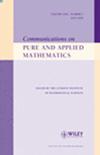Leapfrogging vortex rings for the three-dimensional incompressible Euler equations
IF 2.7
1区 数学
Q1 MATHEMATICS
引用次数: 0
Abstract
A classical problem in fluid dynamics concerns the interaction of multiple vortex rings sharing a common axis of symmetry in an incompressible, inviscid three-dimensional fluid. In 1858, Helmholtz observed that a pair of similar thin, coaxial vortex rings may pass through each other repeatedly due to the induced flow of the rings acting on each other. This celebrated configuration, known as leapfrogging, has not yet been rigorously established. We provide a mathematical justification for this phenomenon by constructing a smooth solution of the 3D Euler equations exhibiting this motion pattern.

三维不可压缩欧拉方程的跃迁涡环
流体动力学中的一个经典问题涉及在不可压缩、不粘性的三维流体中共享一个共同对称轴的多个涡环之间的相互作用。1858 年,亥姆霍兹观察到,一对类似的同轴薄涡旋环可能会因涡旋环的诱导流作用而反复穿过对方。这种著名的构型被称为跃迁,但尚未得到严格证实。我们通过构建表现出这种运动模式的三维欧拉方程平滑解,为这一现象提供了数学依据。
本文章由计算机程序翻译,如有差异,请以英文原文为准。
求助全文
约1分钟内获得全文
求助全文
来源期刊
CiteScore
6.70
自引率
3.30%
发文量
59
审稿时长
>12 weeks
期刊介绍:
Communications on Pure and Applied Mathematics (ISSN 0010-3640) is published monthly, one volume per year, by John Wiley & Sons, Inc. © 2019.
The journal primarily publishes papers originating at or solicited by the Courant Institute of Mathematical Sciences. It features recent developments in applied mathematics, mathematical physics, and mathematical analysis. The topics include partial differential equations, computer science, and applied mathematics. CPAM is devoted to mathematical contributions to the sciences; both theoretical and applied papers, of original or expository type, are included.

 求助内容:
求助内容: 应助结果提醒方式:
应助结果提醒方式:


